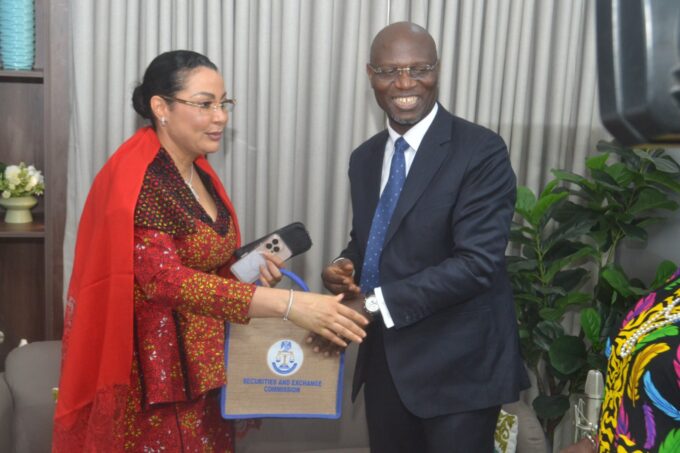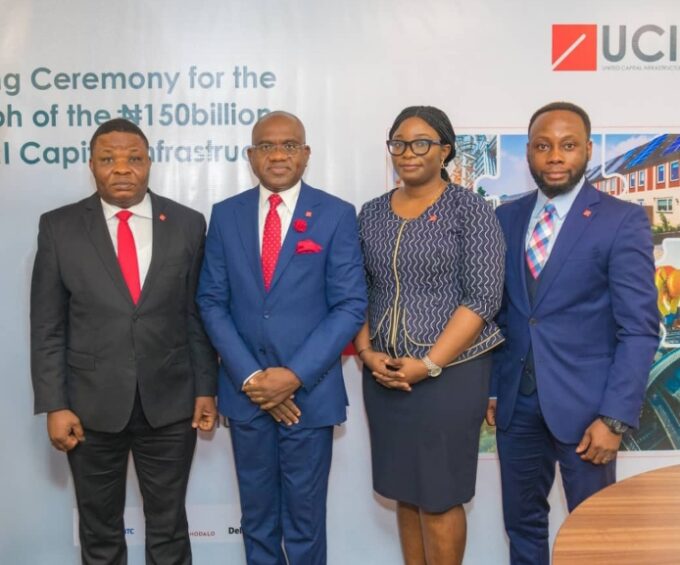Nigerian Exchange Group Plc (“NGX Group” or “The Group”) announces its unaudited results for the half year ended 30 June 2023.
Group Financial Highlights[1]
| Income statement | |||
| In millions of naira | Jun-23 | Jun-22 | % Change |
| Revenue | 3,200.1 | 3,823.3 | -16.3% |
| Other income | 490.3 | 392.5 | 24.9% |
| Gross earnings | 3,690.3 | 4,215.7 | -12.5% |
| Personnel expenses | (1,409.4) | (1,354.5) | -4.1% |
| Operating expenses | (1,028.3) | (991.2) | -3.7% |
| EBITDA | 1,252.6 | 1,870.0 | -33.0% |
| Depreciation and Amortization | (176.6) | (256.9) | +31.3% |
| EBIT | 1,076.0 | 1,613.1 | -33.3% |
| Interest expense on borrowings | (1,207.3) | (1,339.9) | +9.9% |
| Total expenses | (2,614.3) | (2,602.6) | -0.4% |
| Operating (loss)/Profit | 1,076.0 | 1,613.1 | -33.3% |
| Share of profit-equity accounted investees | 857.2 | 950.0 | -9.8% |
| Profit before income tax | 726.0 | 1,223.2 | -40.6% |
| Profit /(loss) for the year | 444.1 | 820.2 | -45.9% |
| Balance sheet | |||
| In millions of naira | Jun-23 | Dec-22 | % Change |
| Cash and cash equivalent | 5,001.7 | 4,749.7 | 5.3% |
| Long-term investment securities | 16,503.2 | 16,330.1 | 1.1% |
| Investment in associates | 27,831.9 | 29,711.2 | -6.3% |
| Property, plant and equipment | 3,688.4 | 3,827.4 | -3.6% |
| Total assets | 54,939.6 | 57,063.2 | -3.7% |
| Total equity | 37,175.3 | 36,807.3 | 1.0% |
| Total liabilities | 17,764.4 | 20,255.9 | -12.3% |
| Key ratios | Jun-23 | Dec-22 | % Change |
| Returns on average equity (ROAE) | 1.2% | 2.2% | -46.1% |
| Return on average assets (ROAA) | 1.9% | 2.8% | -32.0% |
| EBITDA margin | 33.9% | 44.4% | -23.5% |
| Operating profit margin | 29.2% | 38.3% | -23.8% |
| Profit after tax margin |
Commenting, Mr. Oscar N. Onyema (OON), the Group Managing Director/Chief Executive Officer, said:
“While our half-year financial results for 2023 may reflect the impact of economic headwinds, NGX Group demonstrated resilience by recording a profit before tax of N0.7 billion. We are optimistic that with market friendly pronouncements already made by the new government, trading and listing activities will continue the positive impact experienced in June 2023. Consistent with our strategic objective to maximise shareholder value, the Board of Directors has consented to an interim dividend of N0.25 Kobo per ordinary share of 50 Kobo. This translates to a total payout of N495,532,893 (Four Hundred and ninety-five million, five hundred and thirty-two thousand, eight hundred and ninety-three Naira). This initiative underscores better flow through of dividend from an associate company and first-time dividend payment from our flagship subsidiary. It also emphasizes our continued commitment to working collaboratively with our shareholders and other stakeholders in creating and distributing value, even in challenging market conditions”.
Group Financial Performance Review
· Gross earnings recorded a decrease of 12.5% to N3.70 billion from N4.22 billion as of June 2022, while other income increased by 24.9% to N490 million from N393 million in the same period.
· Revenue decreased by 16.3% to N3.2 billion in June 2023 from N3.82 billion recorded in June 2022. This was driven by:
o 14.6% decline in treasury investment income (27.1% of revenue) to N869 million in June 2023 relative to N1,017.4 million in the comparative period in 2022 primarily driven by a comparative reduction in our treasury holdings year over year.
o 21.2% decline in transaction fees (57.2% of revenue) to N1,830 million in June 2023 from N2,320.7 million recorded in June 2022 due to a drop in trading activities in Nigerian Exchange Limited (“NGX” or “The Exchange”).
o 6.7% increase in listing fees (12.1% of revenue) to N388.1 million in June 2023 from N363.8 million in June 2022 buoyed by improved listing on the Exchange in the first half of 2023 relative to the first half of 2022.
o Rental income (2.2% of revenue) earned from NGX Real Estate lease of office floor spaces recorded a 38.6% increase from N51.8 million in June 2022 to N71.7 million as of June 2023.
o 39.5% decline in other fees (1.3% of revenue) to N42.1 million in June 2023 from N69.7 million in June 2022, which represents rental income from the trading floor, annual charges from brokers, dealing license, and membership fees earned by the Group.
24.9% increase in other income (13.3% of gross earnings) was driven primarily by:
o 30.3% improvement in market data income (59% of other income) to N287.98 million from N220.94 million reported in June 2022, which is made up of technology income, other sub-lease income, and penalty fees.
o 22.4% growth in other operating income (31% of other income) from N122.5 million in June 2022 to N149.9 million in June 2023.
· Total expenses grew marginally by 0.4% from N2.60 billion in June 2022 to N2.61 billion in June 2023 primarily driven by a 3.7% growth in operating expenses (39.3% of total expenses) to N1.02 billion from N991.2 million in June 2022. This was moderated because of a decrease in the finance cost (46% of total expenses) of N1.21 billion related to a term loan facility. Personnel expenses (53.9% of total expenses) also grew by 4.1% from N1.35 billion in June 2022 to N1.41 billion during the period under review.
· 33.3% decline in Operating profit of N1,076 million in June 2023 from N1,613.1 million in June 2022, as a result of the 16.3% decline in revenue YoY.
· Profit before income tax declined by 40.6% to N726 million in June 2023 from N1,223.2 million in the corresponding period in 2022 due to a reduction in the top line YoY.
· Profit after income tax declined by 45.9% to N444.1 million from N820.2 million. This also resulted in a decline in profit after-tax margin to 12.03% from 19.45% recorded in June 2022.
· Total assets decreased by 3.7% to N54.94 billion from N57.06 billion in Dec. 2022, driven primarily by a 33.1% decline in Trade and other receivables to N712.86 million from N1,065 million in Dec. 2022, and moderated by a 5.31% growth in Cash and Cash equivalent to N5 billion from N4.75 billion in Dec. 2022.
· Total liabilities saw a 12.3% reduction, falling from N20.3 billion in December 2022 to N17.8 billion. This decrease was primarily due to the repayment of a term loan that was used to finance investments in selected associates.













